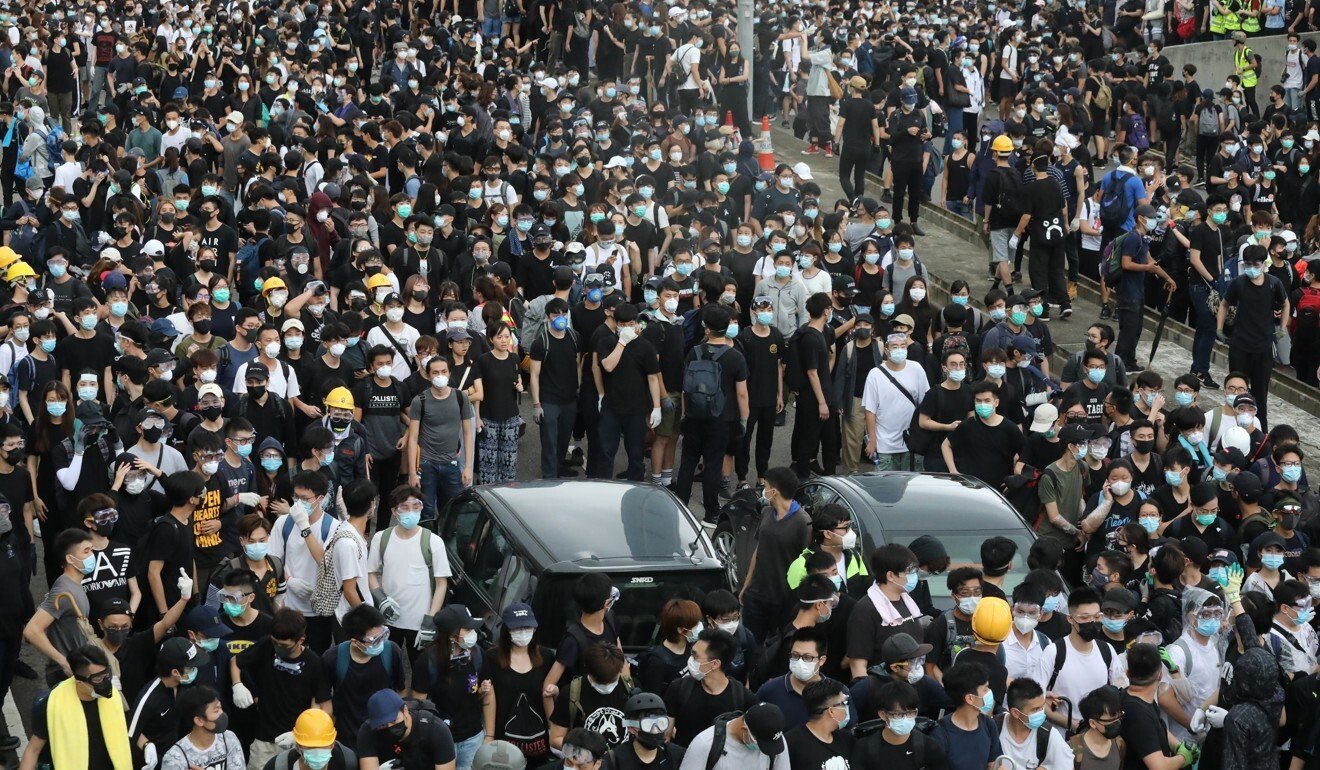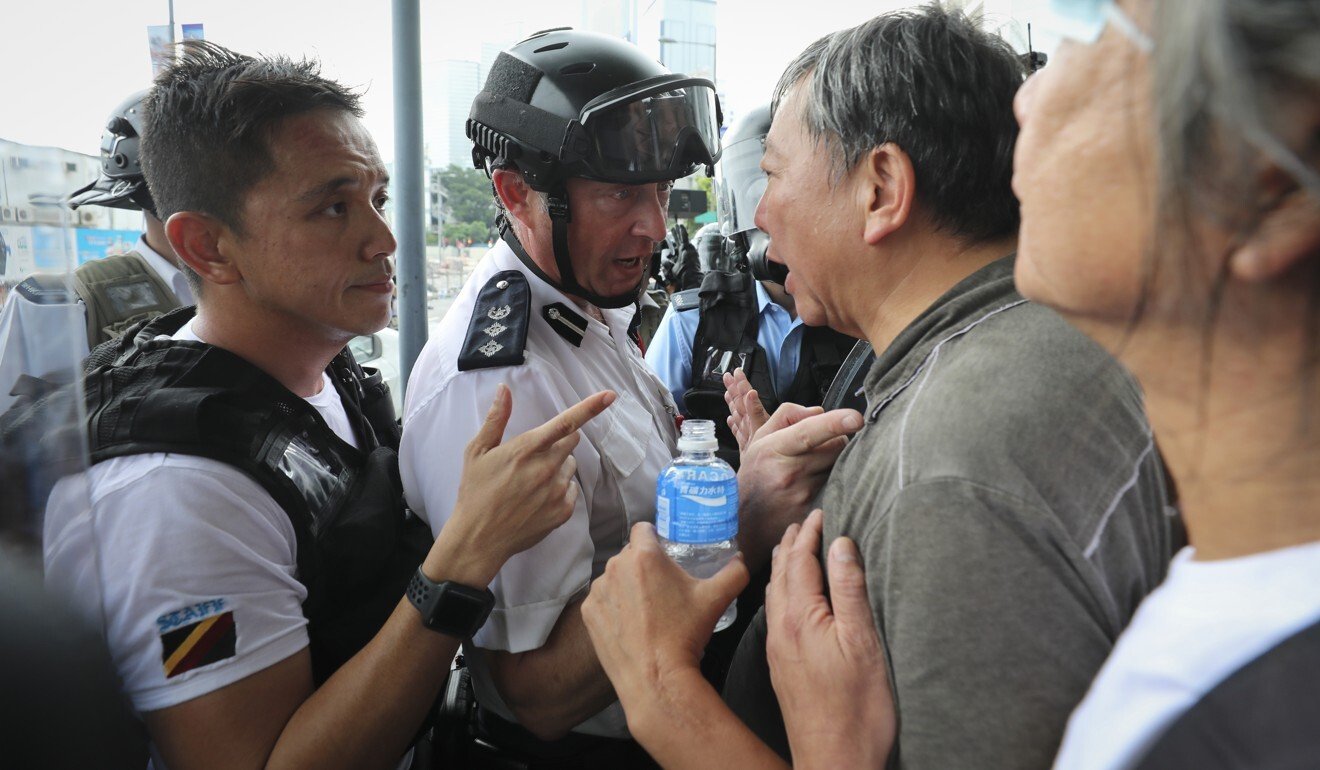
Exclusive | Police commander gives inside account of what led to firing tear gas during Legco protests in Hong Kong on June 12
- Rupert Dover, who was making tactical calls for officers around Lung Wui Road that day, stands by his decision to use canisters of the irritant
- Police needed to get to a government minister trapped in car beneath an underpass and the option was the safest given the circumstances, he says
Rupert Dover, who was one of six senior officers leading the ground response to the demonstrations, also said he could understand the reasons young people might be driven to join the anti-government movement but smashing up the city could not be justified.
Dover explained some of the decisions he made that day in a wide-ranging interview and also shed light on the pain he and his family have suffered from doxxing by radicals. He no longer feels safe having his children live in Hong Kong and they remain in his native Britain.

Had the time come to fire tear gas?
The police had used pepper spray to deter protesters throughout the morning and early afternoon, but not tear gas, and the crowd appeared determined to get to the legislature.
Then Dover was told that several official vehicles, including one carrying a government minister, had been trapped in an underpass since morning and his team had to evacuate them.

Now, on Lung Wui Road near Legco, he was aware that if his officers marched into the crowd, protesters above the underpass could rain down bricks and other projectiles.
At around 3pm, he gave the order to fire tear gas.
“It was the most efficient way,” Dover, 52, told the Post, explaining he was anxious to avoid putting his officers at risk. “There could have been huge casualties to the police.”
Some say that was the first use of tear gas in last year’s protests and it changed the course of the social unrest as participants grew more violent afterwards.
Between June last year and this May, police fired 16,223 rounds of tear gas, 10,108 rubber bullets, 1,885 sponge grenades, 2,033 beanbag rounds and 19 live bullets.
Asked whether he realised at the time using tear gas might affect how the protests played out, the force veteran said: “I was aware of it.”
He was not certain he was the first to order the use of tear gas but declined to say more as the police actions that day were the subject of an ongoing judicial review.
Dover was born in Hertford in Britain and joined the Royal Hong Kong Police Force in 1988 when the city was still a British colony and remained after the handover to China in 1997. He was promoted to assistant police commissioner and appointed regional commander of Kowloon West in February.
He is among 48 foreign-born officers, mostly from Britain, remaining in the 31,000-strong force. Dover and two other senior British-born officers were slammed by protesters on social media for “doing Beijing’s dirty work”, while in London, a Member of Parliament demanded to know what the British government was doing “to bring these British citizens who ordered police brutality to book”.

A British citizen and a Hong Kong permanent resident, Dover said he was neither a “human rights abuser” nor doing “Beijing’s dirty work”, but it was the job of the police to uphold law and order.
He said he understood the frustration of protest participants but was totally against how some went about achieving their goals.
“I do understand some of the rationale – the soaring property prices, the lack of social mobility, perhaps the impression that there are decreased opportunities to move forward in life,” he said. “But that is no excuse for smashing up your home and assaulting members of the public.”
Dover found himself and his family targeted after word spread on social media that he was linked to the use of tear gas on June 12.
Personal information about him and even his family members in Britain began circulating online. Last summer, strangers turned up in Sai Kung, where he lived, looking for his house.
He also received death threats. Then the authorities called to ask whether he had registered as an organ donor after an application had been made using his particulars. The doxxing and threats grew so bad he and his wife decided not to bring their children back from Britain.
Dover said that throughout his career, his loyalties had always been clear.
“I don’t work for China. I don’t work for Beijing. I work for the Hong Kong government. So I work for the Hong Kong people,” he said. “They might not necessarily agree with everything we’ve been doing lately, but honestly, hand on heart, I believe what we have done has saved Hong Kong from a worse fate.”
To read the full interview, click here.











